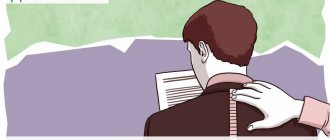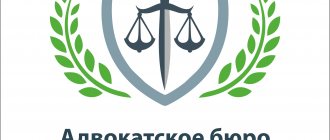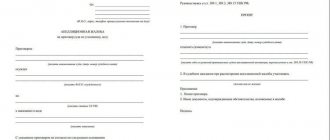- Materials for the article “Ragulin A.V. The verdict in the criminal case was overturned due to violations of the professional rights of the defense lawyer.”
- 1. Text of the speech in the debate
- 2. Verdict - G.
- 3. Addition to the cassation appeal in the case of G.
- 4. Cassation ruling in the case of G.
- 5. Supervisory complaint in the case of G.
- 6. DECISION OF THE SUPERVISORY COURT IN THE CASE OF G.
- All pages
Page 2 of 7
1.Text of the speech in the debate
Judge of the Kirovsky District Court of Ufa
<FAM1> A.Kh.
from the lawyer of the Bar Association of the Republic of Bashkortostan “<FAM2> and partners”
<FAM3> A.V. 450077, Ufa, st. <FAM4> 31/33, tel.: 8-917-40-61340
Text
speeches in the debate on the criminal case against <FAM5> R.Kh.
Your Honor! Dear participants in the process!
Preliminary investigation bodies <FAM5> R.Kh. was charged with the fact that on February 22, 2009, at night, he and his partner <FAM9> A. A., as well as previously acquaintance <FAM7> R. Kh., drank alcoholic beverages in a rented apartment located at the address: Ufa, st. Batyrskaya, 8/1-108. While drinking alcohol, according to investigators, a quarrel arose between <FAM7> R. Kh. and <FAM9> A. A., which escalated into a verbal altercation, at the same time, <FAM5> R. Kh. entered the room . who saw what was happening, and on the basis of a sudden personal hostility towards <FAM7> R.Kh., decided to cause him serious bodily harm, namely, in the period from 03.30 hours to 06.30 hours on February 22, 2009, he deliberately began to strike with his hands and kicking various parts of the body <FAM7> R.Kh., then <FAM5> R.Kh., according to the investigation, picked up a wooden stool, with the edges of the seat of which he began to inflict multiple blows on <FAM11> <FAM7 > R.H.
According to the investigation, <FAM5> R. Kh. caused <FAM7> R. Kh. bodily injuries in the form of a combined injury: closed craniocerebral injury (bruised <NAME> in the occipital region on the right, hemorrhages in the soft tissues <FAM11 > in the frontal region on the left, in the temporal region on the left, in the dark region on the left, in the occipital region on the right, in the projection of the above <NAME>, in the temporal region on the right, hemorrhages in the pia mater, in the cortex and ventricles of the brain), closed blunt chest injury (fractures of ribs on the right from 7 to 9 along the mid-axillary line, 10-12 along the paravertebral line, 11 rib with damage to the parietal and pulmonary pleura and tissue of the right lung, hemothorax), fracture of the right scapula, multiple bruises and abrasions) complicated by edema and dislocation of the brain, caused serious harm to health and are the direct cause of death <FAM7> R. Kh. According to the investigation, the death of <FAM7> R. Kh. occurred as a result of combined trauma (closed craniocerebral injury, closed blunt trauma < FAM11>, fracture of the right scapula, multiple bruises and abrasions), complicated by swelling and dislocation of the brain caused by <FAM5> R.Kh. Actions <FAM5> R.Kh. As a result, they were qualified under Part 4 of Art. 111 of the Criminal Code of the Russian Federation, i.e. as intentional infliction of grievous bodily harm, dangerous to human life, resulting in the death of the victim through negligence.
Analysis of the materials of the criminal case against <FAM5> R.Kh., collected during the preliminary investigation and examined at the court hearing, the testimony of witnesses interrogated during the court session indicate that the guilt of <FAM5> R.Kh. in the crime charged to him, provided for in Part 4 of Art. 111 of the Criminal Code of the Russian Federation has not been proven.
This conclusion should be reached based on the following:
1. <FAM5> R.Kh. did not plead guilty to the crime, testified that he actually struck several blows in the face <FAM7> R.Kh. at about 23-00 hours on February 21, 2009, however this was due to the fact that <FAM7> R.Kh. tried to rape his common-law wife <FAM5> R.Kh. – <FAM9> A.A., who previously informed <FAM5> R.H. that she was expecting a child from him. Thus, the actions of <FAM5> R.Kh. for inflicting a series of blows to the face <FAM7> R.Kh. were caused by the need to stop the criminal actions of the latter. After the incident, <FAM5>, <FAM9>, <FAM26> and a guy named “<NAME>” left the apartment, the door was closed by <FAM7> R.H., who apologized to <FAM5> R. X. for what happened.
Testimony <FAM5> R.Kh. in terms of their application of <FAM7> R.Kh. only a few blows to the face due to the latter’s encroachments on sexual freedom <FAM9> A.A. are confirmed by the testimony of those interrogated at the court hearing <FAM9> A.A. and <FAM31> E.R.
These witnesses indicate that the victim <FAM7> R.Kh. tried to rape <FAM9>, while in his hand, according to the testimony of <FAM9>, there was a knife, <FAM5> R.Kh. dealt only a few blows to the face <FAM7> R.Kh. in order to stop his illegal actions in relation to <FAM9>, while <FAM5> R.Kh. did not strike the body <FAM7> R.Kh. feet or a stool, blood at <FAM7> R.Kh. did not have.
The witnesses who were in the apartment, whose testimony was read out during the trial - <FAM> and <FAM35>, also do not confirm that <FAM5> R.Kh struck the victim <FAM7> R.Kh. a stool.
It should also be noted that the actions of <FAM5> R.Kh. by virtue of Art. 37 of the Criminal Code of the Russian Federation should be regarded as committed in a state of necessary defense, which excludes their criminality.
Along with this, the criminal law directly classifies the commission of a crime in violation of the conditions of legality of the necessary defense, as well as the illegality or immorality of the behavior of the victim, which was the reason for the crime, as mitigating circumstances (clauses “g” and “h” part 1 of article 61 of the Criminal Code RF), however, these circumstances were not even taken into account by the investigator when qualifying the actions of <FAM5> R.Kh.
Questioned at the court hearing <FAM39> E.S. showed that <FAM9> A.A., and <FAM5> R.Kh. o <FAM7> R.Kh. and nothing was said about his death. They do not confirm the guilt of <FAM5> R.Kh. and the testimony of witness <FAM> G.K., interrogated at the court hearing.
Testimony of witnesses <FAM> K.V. , read out at the court hearing cannot be considered as confirming the guilt of <FAM5> R.Kh. in the crime charged against him due to the fact that she was not a direct observer of the events that occurred at the scene. The testimony that she gave, <NAME> from the words, from the words of <FAM> A. cannot be regarded as reliable, since <FAM> A. herself was not interrogated either during the preliminary investigation or during the court hearing. The testimony of <FAM> about her conversation with unfamiliar men also cannot be regarded as evidence of the guilt of <FAM5> R.Kh. of committing the crime charged to him, since no connection has been established between <FAM5> R.Kh. and these men.
3. The fact that one of the stools found in the apartment had prints of <FAM45> <FAM5> R.Kh. and blood, which could have come from <FAM7> R.Kh., as well as the fact that one of the blows on the <FAM11> victim <FAM7> R.Kh. could have been caused by a stool does not directly indicate that it was <FAM5> R.Kh. caused bodily harm to <FAM7> R.Kh. this stool. Prints <FAM5> R.Kh. on the stool could have been left by him when he was in the kitchen of the apartment after his arrival there. In addition, the conclusions contained in expert opinions No. 301 and 113 M-K are probabilistic, and such conclusions cannot be used as the basis for a court verdict.
4. In accordance with Art. 6 Federal Law “On advocacy and advocacy in the Russian Federation” and clause 3, part 1 of art. 53 of the Code of Criminal Procedure of the Russian Federation, I, lawyer <FAM3> A.V., received specialist opinion No. 115/11 dated March 4, 2011, prepared on the basis of studying copies of the criminal case materials by an employee of the Main State Center for Medical and Forensic Expertise <NAME > Russian Federation forensic medical expert, Candidate of Medical Sciences, Honored Doctor of the Russian Federation <FAM> S.M. on issues included in the subject of evidence in the criminal case against <FAM5> R.Kh.
In accordance with clause 3.1. Part 2 Art. 74 and part 3 of Art. 80 of the Code of Criminal Procedure of the Russian Federation, the conclusion of a specialist – i.e. a written judgment on issues posed to a specialist by the parties has the status of evidence in a criminal case. The specialist’s conclusion is drawn up properly; the text of the conclusion contains a detailed analysis of the documents studied by the specialist, reflecting the content of the criminal case materials.
The expert’s conclusion No. 115/11 states that the <FAM> expert D.B. in preparing conclusion No. 603 of February 24 – March 24, 2009 in the criminal case against <FAM5> R.Kh. the requirements of the Code of Criminal Procedure of the Russian Federation and the “Instructions for organizing and conducting expert research in the forensic medical examination bureau” were violated, approved. By order of the Ministry of Health of the Russian Federation dated April 24, 2003. No. 161, as well as during the forensic medical examination, circumstances relevant to the case were not established: in particular, from the questions posed, he ignored questions about the limitation of death; about the mechanism and time of damage; about the limitation of infliction of intravital injuries; about the degree of harm to health and non-fatal injuries; about the life time of the victim after receiving injuries; about the possible position(s) of the victim’s body at the time of each injury; about the possibility of causing injury by a person’s hands or feet; about the presence of lifetime diseases in the victim, which directly contradicts the requirements of both the above laws and departmental instructions (clause 8).
In paragraph 1 of the expert’s report, it is stated that in the research part of the expert’s report there is no description of signs of brain dislocation, and a forensic histological examination did not establish signs of cerebral edema.
In 6.6 of the conclusion it is indicated that <FAM7> R.Kh. diseases - cardiomyopathy of alcoholic origin.
Paragraph 7 of the expert’s report No. 115/11 states that the death of <FAM7> R.Kh. could have occurred from acute heart failure due to alcohol intake; a reference is made to the forensic medical data corresponding to this circumstance, which was unreasonably left by the <FAM> expert D.B. without attention.
Expert <FAM53> D.B., interrogated during the court hearing. showed that the death of <FAM7> R.Kh. occurred 31.6 hours before the examination of the corpse at the scene of the incident - i.e. 31.6 hours before 20-40 hours on February 23, 2009. This means that the death of <FAM7> R.Kh. came on February 22 at approximately 13-40. Considering that in the conclusion of expert <FAM> D.V. it is indicated that the injuries were caused by <FAM7> R.Kh. shortly before death and the possibility of the victim committing independent, purposeful actions within a short period of time after receiving injuries is not excluded, it should be concluded that the bodily injuries of <FAM7> R.Kh. not applied <FAM5> R.Kh. and by another person, since in accordance with the testimony of all persons interrogated in the criminal case, <FAM5> R.Kh. left the apartment at the address: Ufa, st. Batyrskaya, 8/1-108 no later than 01-30 - 02-00 February 22, 2009 Thus, <FAM7> R.Kh. was alive and was in the apartment after the departure of <FAM5> R.Kh. approximately from 02-00 to 13-40 i.e. approximately 11 hours 40 minutes!!!
Even if we assume that <FAM5> R.Kh. left the apartment later than 02-00, the factual circumstances of the case do not fit in any way with the time of infliction of bodily harm, set out in the decision to attract <FAM5> R.Kh. as an accused (from 3-30 to 6-30 o'clock on 02.22.2009), since according to the circumstances of the case and according to the expert's conclusion, the possibility of the life of the victim <FAM7> R.Kh. after causing bodily harm for a significant period of time (from 6:30 to 13:40).
Also expert <FAM53> D.V. showed that to completely exclude the possibility of death <FAM> R.Kh. alcohol consumption cannot be ruled out.
It is also necessary to pay attention to the testimony of the representative of the victim <FAM7> R.Kh. that his brother had not drunk for the last year and a half after he was hit by a car and the surgeon talked to him. At the same time, according to the conclusion of <NAME>, a significant proportion of ethyl alcohol was found in the victim’s blood and urine. These circumstances taken together show that the victim <FAM7>, as directed by the doctor, should not have consumed alcoholic beverages, but he did so, contrary to the instructions.
Thus, from the expert and specialist opinions examined during the court hearing, one should come to the conclusion about the possibility of the death of <FAM7> R.Kh. from alcohol poisoning.
All the above circumstances exclude the possibility of convicting <FAM5> R.Kh. according to Part 4 of Art. 111 of the Criminal Code of the Russian Federation due to the fact that the time of infliction of bodily harm indicated in the resolution on the involvement of <FAM5> R.Kh. as the accused (from 3-30 to 06-30 on February 22, 2009) does not correspond to the actual time of occurrence of bodily injuries on the victim <FAM7> R.Kh. and the possibility of death <FAM7> R.H. has not been refuted. as a result of alcohol poisoning.
It should be noted that the resolution of the Plenum of the Supreme Court of the Russian Federation dated April 29, 1996 No. 1 “On the judicial verdict” (as amended on February 6, 2007) states that in accordance with Art. 302 of the Code of Criminal Procedure of the Russian Federation, a conviction cannot be based on assumptions and is decided only if during the trial the defendant’s guilt of committing a crime is proven. In this regard, the courts must proceed from the fact that a conviction must be based on reliable evidence, when all the emerging versions of the case have been investigated, and the existing contradictions have been clarified and assessed. In accordance with Part 3 of Art. 49 of the Constitution of the Russian Federation and Part 3 of Art. 14 of the Code of Criminal Procedure of the Russian Federation, all irreducible doubts about a person’s guilt are interpreted in favor of the accused.
Doubts regarding the cause of death of <FAM7> R.Kh. that were not eliminated during the trial. (alcohol consumption or bodily injuries) as well as unresolved doubts regarding the time of infliction of bodily injuries discovered by <FAM> expert D.B. at <FAM7> and the time of death of the latter, should be assessed in favor of <FAM5> R.Kh.
Thus, the judicial investigation in the criminal case against <FAM5> R.Kh. showed that all doubts about his innocence in this case were not eliminated, which leads to the conclusion that it is necessary to acquit <FAM5> R.Kh. due to his non-involvement in the crime committed.
4. The testimony of witness <FAM72> E.G. is important for the criminal case under consideration. who testified that he was in the premises of the Kirovsky District Department of Internal Affairs of Ufa in connection with a criminal case against <FAM5> R.Kh. and heard a telephone conversation between an operational police officer and a certain person, as he understood, a forensic medical expert. From the content of the conversation <FAM72> understood that they were talking about the case against <FAM5> R.Kh. and about the death of <FAM7> R.Kh., the operational police officer was told by phone that the death of <FAM7> R.. was due to alcohol poisoning, but the operational officer demanded to prepare a conclusion about the death of <FAM7> R.Kh. . from traumatic brain injury. Employees of the Kirovsky District Department of Internal Affairs beat and asked FAM72 to testify that FAM5 had killed someone, but he refused. Because of the beatings, <FAM72> ended up in the hospital.
These testimonies are consistent with paragraph 7 of the expert’s conclusion No. 115/11, according to which the death of <FAM7> R.Kh. could come from alcohol ingestion.
5. It should be especially emphasized that the version <FAM5> R.Kh. about his non-involvement in what was committed against <FAM7> R.Kh. the crime that led to his death is confirmed by the witness <FAM> B.N., interrogated at the preliminary investigation, whose testimony was read out during the trial. Thus, “FAM” testified that on February 22, 2009, at about 05:30, he woke up from noise, left his apartment, went into room XXX, saw there a man about 160 m tall with red curly hair, a tall woman with <FAM> with short hair, as well as a man who tried to get up with <NAME>, and there was blood on his <FAM11>. At approximately 07:00 am the noise stopped. Then a little later the noise started again, <FAM> came out and saw a girl with bruises on her face and two men. During the court hearing, it was established that <FAM5> R.Kh. as of February 22, 2009 and currently does not fit the description given by <FAM>. Thus, early in the morning of February 22, 2009, the witness <FAM> saw in the apartment at the address Ufa, st. Batyrskaya, 8/1-108, in which the corpse of <FAM7> R.Kh. was subsequently discovered. a man and a woman who were not identified during the investigation, while the victim <FAM7> R.Kh. was alive. These testimonies <FAM> are consistent with the testimony of his wife - witness <FAM> R.A. defendant <FAM5> R.Kh. and witnesses <FAM9> and <FAM31> that various people constantly gathered in the apartment and drank alcoholic beverages. This testimony is consistent with the testimony of <FAM> R.A., read out during the trial and the testimony of witnesses <FAM9>, <FAM31> and “FAM5” R.Kh. about his non-involvement in the death of <FAM7> R.Kh.
Thus, it should be considered proven that immediately before the death of <FAM7> R.Kh. in an apartment at the address Ufa, st. Batyrskaya, 8/1-108 there were an unidentified man and woman. This fact again casts doubt on the guilt of <FAM5> R.Kh. in the crime charged to him, since it could, and most likely, was committed by these unidentified persons whom <FAM7> R.Kh. saw before his death. witness <FAM> B.N.. And here again I note that in accordance with Part 3 of Art. 49 of the Constitution of the Russian Federation and Part 3 of Art. 14 of the Code of Criminal Procedure of the Russian Federation, all irreducible doubts about a person’s guilt are interpreted in favor of the accused.
Based on the foregoing
ASK:
1.<FAM5> R.Kh. Acquitted of the charge brought against him due to his non-involvement in the crime committed.
2. The criminal case should be sent to the prosecutor of the Kirov district of Ufa to organize criminal prosecution of the person who committed a violent crime that resulted in the death of the citizen. <FAM7> R.Kh.
3. This text of the defense speech should be added to the materials of the criminal case.
Lawyer <FAM3> A.V.
"___"________________201_
We introduce you to a variety of children's games intended for a wide range of users. Website Childhood, all detailed information on the website https://child-hood.ru
- << Back
- Forward >>
Stages of consideration of a criminal case
The stages of the trial are strictly regulated by the Code of Criminal Procedure. The court has the right to deviate from observing the sequence of these stages, but each of the stages must be completed, even formally.
So, for example, at the beginning of each court hearing, the court determines whether the participants in the process have petitions. In most cases this is a formality, but it must be respected.
The omission (absence of information in the protocol of the court hearing) of at least one of the stages is grounds for canceling the sentence.
Process continuity principle
During the existence of the USSR, criminal proceedings in court were continuous. Regarding the principle of continuity in Soviet criminal proceedings, there are many speculations that do not correspond to reality.
Continuity did not mean that the criminal hearing that had begun could not be interrupted. This meant that the court that declared a break in a criminal case did not have the right to consider other criminal cases during the break.
Taking into account the fact that in the USSR there was no division in district courts into judges who considered only criminal cases and judges who considered exclusively civil cases, during breaks in criminal cases it was possible to consider civil cases or administrative materials.
Since there were many cases, including criminal ones, before the judges, the judges got out of the situation by announcing not a break, but a postponement of the criminal case, if there was even the slightest reason for this. After the hearing was adjourned, judges were free to consider other criminal cases.
At the first court hearing after the adjournment, the court again announced the composition of the court and established the procedure for examining the case.
How to behave in court and the participation of a lawyer in a criminal case
In the Code you can find a fairly large number of articles establishing the duties and rights of the defendant, who is one of the main defendants in criminal proceedings. Its outcome often depends to a large extent on the effectiveness of the defendant's defense. He has a large number of rights, the main ones being:
As modern judicial practice shows, most decisions are made with the taking into custody of the defendant, who is usually found and detained by law enforcement agencies without much difficulty. In this case, he is brought to court hearings forcibly and under escort. You should not run away from court: it is possible that the judge does not intend to pass a sentence with a real term of restriction of freedom.
Speech by a lawyer when a defendant admits guilt sample
These circumstances were confirmed by the testimony of the victims. Why did such a contradictory picture of what happened emerge? It is for understanding this that the motive by virtue of which my client went to V’s house is important. During the judicial investigation, the circumstances and events immediately preceding the so-called illegal entry into the home, allegedly committed by my client, were closely studied, despite the protests of some participants in the process and then that he, it would seem, have nothing to do with the charges brought against him.
Dear Colleagues! Speaker: Alexey Valerievich Ivanov - lawyer at the Chamber of Lawyers of the Krasnodar Territory, member of the Commission for the Protection of Professional Rights of Lawyers. Topic: “Personal view of the work of a lawyer in a jury trial.” Place: Omsk regional business incubator








